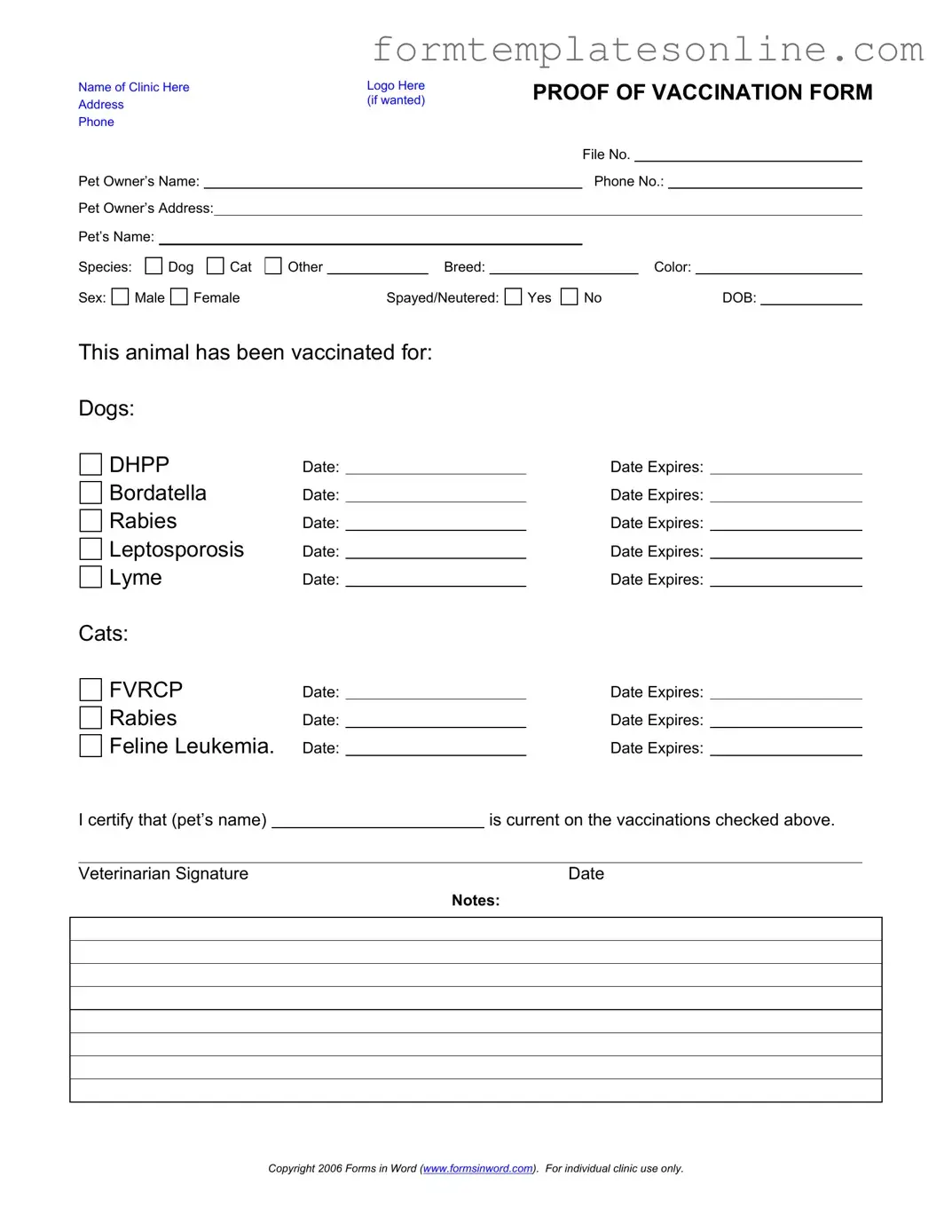Proof Of Vaccination Dog PDF Form
When it comes to ensuring the health and safety of pets, the Proof of Vaccination Dog form serves as a vital document for pet owners and veterinary clinics alike. This form not only includes essential details such as the pet owner's name, contact information, and the pet's specifics—like name, breed, color, and sex—but also provides a comprehensive record of vaccinations administered to the dog. Key vaccinations, including DHPP, Bordetella, Rabies, Leptospirosis, and Lyme, are documented alongside their respective dates and expiration dates, ensuring that pet owners remain informed about their dog's vaccination status. Furthermore, the form requires the veterinarian's signature to certify that the pet is current on the necessary vaccinations. This certification is crucial, especially when traveling, boarding, or participating in dog-related activities where proof of vaccination may be mandated. Ultimately, the Proof of Vaccination Dog form not only protects the health of individual pets but also contributes to broader public health efforts by preventing the spread of infectious diseases.
Common mistakes
-
Incomplete Owner Information: Failing to provide full contact details can lead to confusion. Ensure that the pet owner's name, phone number, and address are clearly filled out.
-
Incorrect Pet Information: Double-check that the pet's name, species, breed, color, and sex are accurately recorded. Mistakes in this section can complicate vaccination records.
-
Missing Vaccination Dates: It's crucial to include the exact dates when vaccinations were administered. Omitting this information can render the form incomplete.
-
Expiration Dates Not Provided: Each vaccination should have an expiration date noted. Without this, it may be unclear when the next vaccination is due.
-
Neglecting to Sign the Form: The veterinarian's signature is essential for validation. A missing signature can lead to disputes about the authenticity of the vaccination.
-
Ignoring the Certification Statement: The statement certifying that the pet is current on vaccinations must be acknowledged. Failing to do so could invalidate the form.
Example - Proof Of Vaccination Dog Form

Name of Clinic Here |
Logo Here |
Address |
(if wanted) |
|
|
Phone |
|
PROOF OF VACCINATION FORM
|
|
|
|
|
|
|
|
|
|
|
|
File No. |
|
|
|
||
Pet Owner’s Name: |
|
|
|
|
|
|
|
Phone No.: |
|
|
|
||||||
Pet Owner’s Address: |
|
|
|
|
|
|
|
|
|
|
|
|
|||||
Pet’s Name: |
|
|
|
|
|
|
|
|
|
|
|
|
|
|
|
||
Species: |
|
|
Dog |
Cat |
Other |
|
Breed: |
|
|
|
|
Color: |
|
|
|||
Sex: |
Male |
Female |
|
Spayed/Neutered: |
Yes |
No |
DOB: |
|
|||||||||
This animal has been vaccinated for:
Dogs:
DHPP
Bordatella
Rabies
Leptosporosis
Lyme
Date: |
|
Date Expires: |
Date: |
|
Date Expires: |
Date: |
|
Date Expires: |
Date: |
|
Date Expires: |
Date: |
|
Date Expires: |
Cats:
FVRCP
Rabies
Feline Leukemia.
Date: |
|
Date Expires: |
Date: |
|
Date Expires: |
Date: |
|
Date Expires: |
|
I certify that (pet’s name) |
|
is current on the vaccinations checked above. |
|
|
|
|
|
|
|
Veterinarian Signature |
|
Date |
|
|
|
NOTES: |
|
|
|
|
|
|
|
|
|
|
|
|
|
|
|
|
|
|
|
|
|
|
|
|
|
|
|
|
|
|
|
|
|
|
|
|
|
|
|
|
|
|
|
|
|
|
|
Copyright 2006 Forms in Word (www.formsinword.com). For individual clinic use only.
More About Proof Of Vaccination Dog
What is the Proof Of Vaccination Dog form?
The Proof Of Vaccination Dog form is a document that certifies your dog has received the necessary vaccinations. It includes details such as your pet’s name, breed, and the specific vaccines administered, along with their expiration dates. This form is essential for pet owners to keep track of their dog's vaccination status and is often required for boarding, grooming, or traveling with your pet.
What information is included in the form?
The form contains several key pieces of information. You'll find sections for the pet owner's name, contact details, and the pet's specifics, such as name, species, breed, color, and sex. It also lists the vaccinations your dog has received, including DHPP, Bordetella, Rabies, Leptospirosis, and Lyme, along with the dates administered and their expiration dates. A veterinarian's signature is required to validate the form.
Why is it important to keep this form updated?
Keeping the Proof Of Vaccination Dog form updated is crucial for your pet’s health and safety. Vaccinations can expire, and having an up-to-date record ensures that your dog is protected against various diseases. Additionally, many facilities require proof of current vaccinations to allow your pet entry, so maintaining this document can prevent any last-minute issues.
How can I obtain a Proof Of Vaccination Dog form?
You can obtain a Proof Of Vaccination Dog form from your veterinarian's office. They typically provide this documentation after administering vaccinations. If you need a replacement or a new form, simply ask your vet, and they can assist you in getting the necessary paperwork.
What should I do if I lose the form?
If you lose the Proof Of Vaccination Dog form, don't worry. You can contact your veterinarian to request a new copy. They will have records of your dog’s vaccinations and can issue a replacement form. Keeping a digital copy or taking a photo of the form can help prevent future loss.
Is there a fee for obtaining the form?
Typically, there is no fee specifically for obtaining the Proof Of Vaccination Dog form itself. However, if you need to have your pet vaccinated again or if your veterinarian charges for administrative services, there may be associated costs. It's best to check with your vet's office for any potential fees related to your specific situation.
Key takeaways
When filling out and using the Proof Of Vaccination Dog form, consider the following key takeaways:
- Accurate Information: Ensure that all fields are completed accurately, including the pet owner's name, contact information, and pet details.
- Vaccination Details: Clearly indicate which vaccinations the pet has received, including the specific dates and expiration dates for each.
- Veterinarian Certification: The form must be signed by a veterinarian to validate the vaccination information provided.
- Keep a Copy: Retain a copy of the completed form for your records, as it may be required for travel, boarding, or other services.
- Consult Clinic Policies: Different clinics may have specific requirements regarding the form, so it is advisable to check with the clinic if any questions arise.
Form Attributes
| Fact Name | Description |
|---|---|
| Purpose | The Proof of Vaccination Dog form certifies that a pet has received necessary vaccinations. |
| Pet Owner Information | The form collects details about the pet owner, including their name, phone number, and address. |
| Pet Details | Information about the pet, such as name, species, breed, color, sex, and date of birth, is required. |
| Vaccination Records | The form lists vaccinations for dogs, including DHPP, Bordatella, Rabies, Leptosporosis, and Lyme. |
| Expiration Dates | For each vaccination, the form requires the date administered and the expiration date. |
| Certification | The veterinarian must sign the form, certifying that the pet is current on vaccinations. |
| Legal Requirements | Some states have specific laws regarding vaccination documentation for pets, such as California's Health and Safety Code Section 121690. |
| Clinic Use | This form is intended for individual clinic use only, as noted in the copyright section. |
| Copyright Information | The form is copyrighted by Forms in Word, indicating it is not for public distribution without permission. |
Other PDF Forms
Free Printable Physical Exam Forms - Information for emergencies allows for quicker responses if needed.
A Georgia Power of Attorney form is a legal document that gives one person the authority to act on behalf of another. This authority can cover a wide range of activities, from managing finances to making healthcare decisions. It's a crucial tool for planning and managing personal affairs, especially in unforeseen circumstances. For more information, you can visit OnlineLawDocs.com.
Health Guarantee for Puppies Template - Genetic defects diagnosed by a vet up to six months after purchase are covered under this agreement.
Dos and Don'ts
When filling out the Proof of Vaccination Dog form, it is important to follow certain guidelines to ensure accuracy and completeness. Below is a list of things you should and shouldn't do.
- Do provide accurate information for the pet owner's name and contact details.
- Do clearly indicate the pet's name and species to avoid confusion.
- Do check the appropriate vaccinations that the dog has received.
- Do include the dates of vaccinations along with their expiration dates.
- Don't leave any sections blank; incomplete forms may lead to issues.
- Don't use abbreviations or nicknames for the pet's name or breed.
- Don't forget to obtain the veterinarian's signature and date the form.
- Don't submit the form without double-checking for errors or omissions.
